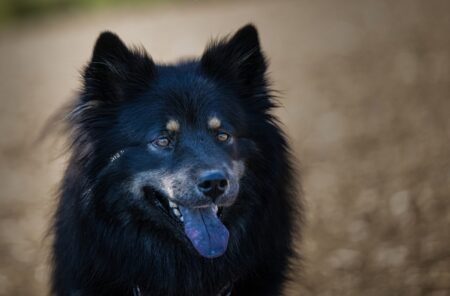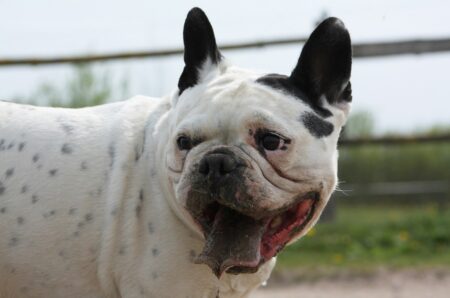Black Spot On Dog’s Tongue Getting Bigger
A black spot on a dog’s tongue can be a sign of a benign growth, an infection, or an irritation. The spot can range in size from a small black dot to a large blotch. It is important to take your dog to the vet if you notice a spot on its tongue that seems to be getting bigger, as it could be indicative of a more serious underlying condition. The vet will be able to properly diagnose and treat the condition, and prescribe any necessary medications. When treating the spot, the vet may recommend lifestyle changes, antibiotics, or surgery, depending on what is causing the growth. In some cases, the spot may not need any treatment. However, it is important to monitor the spot and report any changes or unusual symptoms to the vet.
Black Spot On Dog’s Tongue Getting Bigger
A black spot on a dog’s tongue that is getting bigger could indicate a variety of potential issues, including benign discoloration, a fungal infection, an abscess, or even cancer. It is important to take your dog to the veterinarian as soon as possible to get an accurate diagnosis and treatment. If the spot appears suddenly, it is possible that it is an abscess that should be drained as soon as possible. If the spot has been there for a while and is slowly getting bigger, it could indicate a fungal or bacterial infection. A biopsy may be necessary to determine if the spot is a malignant tumor. Your veterinarian can perform all the necessary tests to give your dog the best chance of a full recovery.
What Does It Mean When Dogs Have Black Spots On Their Tongues?
Black spots on a dog’s tongue are usually completely harmless and usually indicate pigmentation. This is quite common in breeds such as Shar Peis, Chow Chows, and Mastiffs. Occasionally, the spots may indicate an underlying medical condition, such as an infection or a deficiency, and it’s always best to see a veterinarian in this case.
Is It Normal For Dogs To Have A Black Mouth?
Yes, it is normal for dogs to have black mouths, especially if they are black or dark-colored dogs. Many dogs also have black or dark-colored noses and lips. The color of a dog’s mouth depends on the breed and color of the coat.
What Do Normal Black Spots On Dogs’ Tongues Look Like?
Normal black spots on a dog’s tongue should appear as dark dots, usually ranging in size from tiny to a bit larger, and they can be either raised from the papillae or somewhat flat against the tongue. These dots are typically black, but some dogs may have spots that are more gray, brown, or even pink.
What Happens When A Dog’s Tongue Turns Black?
When a dog’s tongue turns black, it may be an indication that the dog has acquired a metallic poisoning of some sort, such as lead poisoning. This will usually involve lead being absorbed through the gastrointestinal tract, either through ingestion of lead paint chips or ingestion of lead-tainted soil or water. The black color is due to the formation of lead sulfide as the lead passes through the gastrointestinal tract and then attaches to the red blood cells in the dog’s body. The lead then builds up in the dog’s tissues and organs, leading to symptoms such as seizures, vomiting, anemia, and potentially even death. Treatment of lead poisoning usually involves chelation therapy in order to remove the lead from the dog’s system.
Unhealthy Dog Tongue
The tongue is an important part of a dog’s anatomy, serving a variety of purposes from cooling and grooming to gathering information about their environment. A healthy tongue should be pink, firm, moist, and free of any swelling or discoloration. However, due to a variety of physical and environmental stresses, this organ can become diseased or injured, resulting in unhealthy changes in appearance and functioning.
The most common cause of an unhealthy tongue in dogs is trauma. Dogs may accidentally bite their own tongues or are injured by sharp objects such as thorns, glass, wire fencing, or other such material. It is not uncommon for a dog to experience pain and bleeding around the tip of the tongue following such incidents. Depending on the severity of the trauma, the tongue may swell, turn black or purple in color, and become tender to the touch. It is important to seek immediate veterinary attention if any of these changes occur, as timely treatment can often save the tongue from necrosis and infection.
In addition to trauma, an unhealthy dog’s tongue can be affected by parasites and bacterial or viral infections. Common parasites that dogs can pick up in their environment or from other animals include whipworms, hookworms, and giardia. These parasites can cause discoloration, ulcerations, and a painful sensation on the surface of the tongue. Bacterial and viral infections, such as stomatitis or candidiasis, can also cause inflammation and a variety of other symptoms.
Regardless of the cause, it is important to seek veterinary attention immediately if there are any changes to your dog’s tongue. The vet may recommend a variety of treatments such as antibiotics, anti-inflammatory medications, and supportive care. If the problem is caused by parasites, the vet may also perform tests to confirm the diagnosis and recommend an appropriate deworming protocol. With proper care, most tongue injuries or infections can be quickly managed and your pup will be back to lapping up the love with a healthy tongue in no time.
Black Spots On Dog Tongue And Cancer
Black spots on a dog’s tongue aren’t usually a sign of cancer. However, your dog should be taken to the vet for an examination to make sure the spots are not indicative of a more serious health issue. The most common causes of black spots on a dog’s tongue are benign cysts, melanin concentration, or trauma. Other potential causes could include bacterial or fungal infection, trauma, endocrine disorders, or an oral tumor.
What Causes Black Spots On My Dog’s Tongue?
One of the most commonly seen causes of black spots on a dog’s tongue is melanoma. Melanoma is a type of cancer that can appear in the form of black spots and usually occurs on the tongue or inside the mouth. Other possible causes of black spots on a dog’s tongue include fungal infection, bacterial infection, trauma or an injury, benign growths, melanocytic hyperplasia, and hypopigmentation.
The most serious cause of black spots on a dog’s tongue is melanoma, which is an excessive growth of melanocytes (a type of skin cell) into a tumor. Melanoma can often be detected by feeling for a lump or bump on the dog’s tongue. The most common warning signs of melanoma are bad breath, excessive drooling, swellings of the mouth or tongue, and changes in eating habits. If you suspect that your dog has melanoma, it’s important to take him to the vet as soon as possible for a diagnosis.
Another common cause of black spots on a dog’s tongue is a fungal infection. This usually happens when the dog has uncared-for teeth and gums, and the fungus spreads into the tongue. Fungal infections can often be treated with antifungal medication, but in more severe cases, surgery may be required.
Bacterial infections, including gingivitis, can also result in black spots on a dog’s tongue. These infections usually occur as a result of poor dental hygiene, and they can be further aggravated by an uncleaned food bowl. In these cases, antibiotics may be prescribed.
Injury and trauma are also common causes of black spots on a dog’s tongue. These can occur when the dog is playing, gnawing on an object, or being bitten by another animal. In these cases, veterinary treatment is usually necessary.
Benign growths, such as cysts and papillomas, can also result in black spots on a dog’s tongue. papilloma These may range in size and typically feel firm to the touch when palpated. This type of growth must be removed by a veterinarian, as it can spread to other areas of the body if left untreated.
Melanocytic hyperplasia is another cause of black spots on a dog’s tongue. This condition is characterized by an overproduction of melanocytes in the affected area. These melanocytes are seen as dark patches either on the top or bottom of the tongue. This condition is usually harmless, however, if your dog is displaying any other symptoms, it’s important to take him to the vet for a diagnosis.
Lastly, hypopigmentation can also occur and cause black spots on a dog’s tongue. Hypopigmentation is when the affected area of the tongue appears lighter than the surrounding cells. This condition is often caused by chronic inflammation, and it should be treated by a veterinarian right away.
Black Tongue In Dogs Due To Deficiency
Black tongue in dogs can be caused by vitamin and mineral deficiencies such as zinc deficiency, iron deficiency, and B vitamin deficiency. A diet lacking these essential vitamins and minerals can cause a black or dark discoloration on the tongue. It is important to make sure that your dog is receiving proper diet and nutrition to avoid symptoms of these deficiencies. Treatment for black tongue may include supplementing the dog’s diet with the proper vitamins and minerals and providing plenty of fresh, clean water. Your veterinarian can help diagnose and recommend treatment for skin and tongue pigmentation issues in dogs.
Is It Normal If The Dog Is Born With A Black-Spotted Tongue?
Yes, it is normal for some dogs to be born with a black-spotted tongue. This is especially common in Chinese Shar-Pei, Chow Chow, and Akita breeds.
Which Dog Breeds Have Black Tongues?
The following dog breeds are all known for their black tongues:
- Chinese Shar-Pei: This breed is native to southern China and is characterized by its distinct wrinkled skin and black tongue. The wrinkling is believed to have developed to help the breed stay cool in the hot climate of South China.
- Chow Chow: This breed is native to northern China and is believed to be one of the oldest breeds still existing today. One of its most distinguishing features is its black tongue which can sometimes have a hint of blue to it.
- Tibetan Mastiff: This breed is native to Tibet and is known for its impressive size and stature. The breed also has a unique black tongue that has often been described as looking as though it has been dipped in ink.
- Finnish Spitz: This breed is native to Finland and is recognized for its unique bark that has been likened to a yodel. Alongside its golden coat, the breed also has a pitch-black tongue.
- Karelian Bear Dog: This breed is native to Finland and is known for its courage and intelligence. Like other black tongue breeds, this breed also has a unique black tongue that is believed to help them hunt and keep warm in cold climates.
Black Spot On Dog Tongue Labrador
If you see a black spot on your Labrador’s tongue it should be checked out by a veterinarian as soon as possible. It could be a sign of melanoma, which is a type of cancer. It’s important to get an accurate diagnosis as soon as possible to avoid further complications. Treatment options depend on the particular type of melanoma present but may include surgery, cryoablation, radiation therapy, or chemotherapy.
Dog Black Spot On Tongue Golden Retriever
If your Golden Retriever has a black spot on their tongue, it is likely benign. That said, it is still important to consult with your veterinarian to rule out any medical causes. In some cases, the spot can be a symptom of oral melanoma which is a form of skin cancer. A veterinarian can also check for any underlying issues that could be causing the discoloration.
How Common Are Dogs With Spotted Tongues?
Dogs with spotted tongues are quite rare, and it is often associated with the spotting gene in dogs. It is considered a genetic mutation and is found in some breeds including Australian Shepherds. It is also seen in dogs with coat color patterns such as merle or dapple. The degree of the spotted tongue can vary, from light flecks to larger, more distinct spots.
When To Worry About A Black Spot On Your Dog’s Tongue
If a black spot is suddenly noticed on your dog’s tongue, you should contact your veterinarian to get it checked out. It is possible that the black spot may be a benign lesion or a sign of something more serious, such as melanoma. Other potential causes may range from an ulcerated melanocytic macule to oral melanoma. Your veterinarian will be able to perform a physical exam and take a sample for a biopsy to make an accurate diagnosis.
FAQ
Q. Why is there a black spot on my tongue?
A. A black spot on the tongue is usually caused by a type of bacteria known as “black tongue bacteria.” This bacteria builds up in the cracks and folds of the tongue and causes discoloration. It is not usually a serious condition and can usually be treated by improved oral hygiene.
Q. Are Dogs With Black Tongues Aggressive?
A. The color of a dog’s tongue is not necessarily related to its aggression level. In general, dogs are very individualized and their personality is based on a combination of factors such as genetics, environment, and training. Some black-tongued breeds like the Chow Chow are considered to be a bit aloof and can be suspicious of strangers, but the color of their tongues is not necessarily indicative of their temperament.
Q. Do the black spots mean the dog is not purebred?
A. No, the black spots on a dog’s coat have no bearing on the purity of its breed. They are simply markings that differentiate one breed from another. Different breeds have different patterns and colors that help to identify them.
Q. Are Black Spots on Dog Tongues A Health Problem?
A. No, black spots on dog tongues are not a health problem. Black spots on the tongue are known as “black spotter” and they are caused by cells of the upper layer of the tongue, known as the filiform papillae, being pigmented with melanin. They are quite common in canines and are not a sign of a health issue.
Conclusion
It is possible that a black spot on a dog’s tongue could get bigger, but it is not a common occurrence. If the spot becomes bigger, it is important to consult your veterinarian right away for an expert opinion and possible diagnosis of the cause. Treatment may be necessary to address any underlying conditions or diseases that may contribute to the size of the spot.

